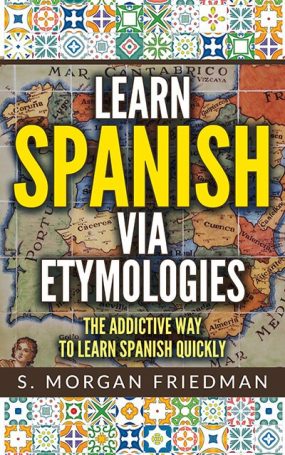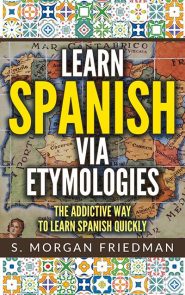Demasiado and Master
- Posted by Morgan
- on Mar 28, 2024
- in True Spanish Etymology Stories
The Spanish demasiado (“enough!”) comes from the Latin adverb magis, meaning “more!”.
From that same root magis, we also get the English… master.
It goes to show you: a master is really someone who, as Depeche Mode said, just can’t get enough. So they keep going and going and going, until they’ve become a master.
The m-s root maps clearly to both words.
- See more of this pattern: True Spanish Etymology Stories
Salchicha and Chisel
- Posted by Morgan
- on Mar 28, 2024
- in True Spanish Etymology Stories

To chisel, and the Spanish salchicha (basically, hot dog) both come from the same root: the Latin secare, meaning “to cut, sever, decide”.
Other English words some from the same Latin root secare, such as dissect.
How did “to cut” turn into “hot dog”? Via the Italian Salsiccia — and if you think about it, the hot dog is indeed just a very finely chiseled piece of meat!
- See more of this pattern: True Spanish Etymology Stories
Jueves – Thursday
- Posted by Morgan
- on Mar 27, 2024
- in True Spanish Etymology Stories
 Thursday and Jueves, like the other days of the week, come from the Germanic and Latin names for the same God: the King of the Gods, the God known as “Zeus” to the Greeks, and sometimes as “Jupiter.”
Thursday and Jueves, like the other days of the week, come from the Germanic and Latin names for the same God: the King of the Gods, the God known as “Zeus” to the Greeks, and sometimes as “Jupiter.”
The King of the Gods was often called “Jove” (we still remember this in English: sometimes people euphemistically say, “By Jove!”) — hence, Jueves. And the Germanic equivalent of the same God is Thor — and Thursday is literally, “Thor’s Day”!
- See more of this pattern: True Spanish Etymology Stories
Humo and Fumes
- Posted by Morgan
- on Mar 27, 2024
- in Initial F to H, Patterns
If he is fuming, he is smoking — literally. And it is, subtly, the same word in Spanish.
“To fume” comes from the Latin root fumus (“smoke”) from which we also get the common Spanish word for “smoke”, humo. But they don’t sound alike, so how are they related?
The Spanish humo is a great example of the pattern of the Initial F turning into an H in Spanish, alone among the languages of the world. Many Latin words that began with an F that came to us in English through the Latinate F form, became the equivalent word but with an H- in Spanish. Take hermano and filial, for example. Or fact and hecho.
Other English words from the same root fumus include fumigation (ahhhh!) and the less common fetid. Fetid is a dirty, Shakespearean word, after all.
- See more of this pattern: Initial F to H, Patterns
Buscar and Postulate
- Posted by Morgan
- on Mar 27, 2024
- in True Spanish Etymology Stories
Buscar (Spanish for “to ask for”) comes from the Latin poscere (“to ask urgently”). In the transition from Latin to Spanish, the word was definitely weakened since buscar doesn’t have any urgent implication.
From this Latin root, we also get the English word… postulate. Postulating is really just formulating a thesis and wanting responses — which is just a sophisticated form of asking a question!
We can see the b-s-c of buscar maps to the p-s-t of postulate.
- See more of this pattern: True Spanish Etymology Stories
Cuero and Cork
- Posted by Morgan
- on Mar 26, 2024
- in True Spanish Etymology Stories
The Spanish for “leather,” cuero, comes from the Latin corium meaning, “leather or hide.” From that root, we get a few English words, including… cork. A cork is made from the the hide of a tree, after all!
From the same root we also get cortex (the tree that runs up your spine!), scrotum (feels like a skin, doesn’t it?)
We can see the c-r root clearly in all these words!
- See more of this pattern: True Spanish Etymology Stories
what is the etymological way to learn spanish?
Nerds love to pattern-match, to find commonalities among everything. Our approach to learning languages revolves (the same -volve- that is in “volver”, to “return”) around connecting the Spanish words to the related English words via their common etymologies – to find the linguistic patterns, because these patterns become easy triggers to remember what words mean. Want to know more? Email us and ask:
morgan@westegg.com

